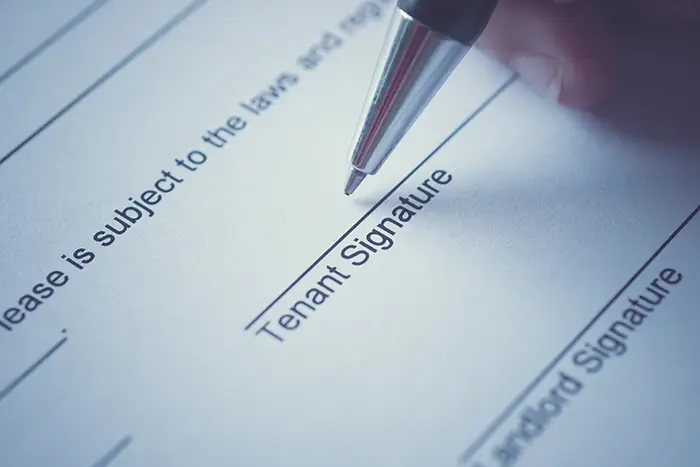What to Look For in a Tenant
Published on November 10, 2023 | 5 Minute read

Melanie
Ortiz Reyes
Content Specialist
So, you've got a rental property, and now you're on the hunt for the ideal tenant. It's not just about filling a space; it's about finding someone who will treat your property like a home. Renting out your property can be a rewarding venture, but finding the right tenant is crucial for a smooth and mutually beneficial experience.
Tenant screening is a critical aspect of being a responsible landlord, and recognizing red flags early can save you from potential headaches down the road. By staying vigilant during the screening process, you can select tenants who are more likely to be responsible and respectful of your property. Here's what to look for:

The First Impression - Initial Contact Matters
The first interaction with a potential tenant sets the tone for the entire relationship. Whether it's through email, a phone call, or an in-person meeting, pay attention to their communication style. Are they prompt in responding? Do they ask thoughtful questions? Red flags may appear if an applicant displays poor communication skills during the screening process or is consistently unresponsive to inquiries. A tenant who is unclear or uncooperative may signal challenges in the future when addressing concerns or resolving issues.
Transitioning from the initial contact to the application process should feel like a smooth ride. If you encounter any bumps early on, it might be a sign to proceed with caution.
The Paperwork Game - Screening for Reliability
Once you've got a potential renter interested, it's time to dig into the paperwork. A comprehensive rental application is your ticket to understanding the tenant's financial responsibility, rental history, and more.
Look for consistency and clarity in the application. A well-documented rental history, steady income, and positive references from previous landlords are green flags. Don't hesitate to ask questions about any gaps or peculiarities in the application – an open dialogue sets the stage for a transparent landlord-tenant relationship.

Credit Check and Employment History - Assessing for Financial Responsibility
Now, let's talk numbers. One of the primary red flags to watch out for is an applicant with inconsistent employment or income. A stable job and a reliable income are key indicators of a tenant's ability to meet their rent obligations. If there are gaps in employment or frequent job changes, it might signal financial instability.
Running a credit check is another crucial step in determining a potential tenant's financial responsibility. A good credit score is generally indicative of a person's ability to manage their finances responsibly. While a less-than-perfect credit score isn't necessarily a deal-breaker, it's essential to understand the context. An open conversation about any financial challenges can provide valuable insights into the tenant's current situation and their commitment to meeting their rental obligations.
Background Checks - Ensuring Safety and Trust
Ensuring the safety of your property and other tenants is paramount. A thorough background check helps uncover any criminal history that might be cause for concern.
Discovering legal or criminal issues during a background check should raise immediate concern. Red flags may include a history of evictions, involvement in illegal activities, or a criminal record that poses a threat to the safety of the property or other tenants.
It's not about judging someone for their past mistakes but rather understanding how it might impact the safety and well-being of your rental property. Be sure to comply with all relevant laws and regulations when conducting background checks.

Rental History - The Trail of Rental Behavior
One of the best indicators of future behavior is past behavior. Contacting previous landlords provides insights into how a tenant treated their previous rental homes. Were they prompt with rent payments? Did they maintain the property well? Here are other questions you should ask:
- Did they provide proper notice before moving out?
- Were there any significant damages beyond normal wear and tear?
- Were there any instances of lease violations, and if so, how were they resolved?
- Were they proactive in reporting issues, and did they allow timely access for necessary repairs?
- Did the tenant have positive relationships with neighbors, or were there any complaints?
- Based on your experience, would you recommend this tenant to another landlord?
This is your chance to get a firsthand account of the tenant's habits and reliability. It's like reading reviews before trying a new restaurant – previous experiences can be a reliable predictor of future satisfaction.
Contacting previous landlords for references is a standard practice in tenant screening. If you receive negative feedback about an applicant's behavior, such as late payments, property damage, or conflicts with neighbors, it's a clear red flag. Learning from past landlord experiences can help you avoid potential issues in the future.

Communication Style - A Key to Harmonious Relationships
Renting isn't just about contracts and payments; it's also about building a positive and communicative relationship. Pay attention to the potential tenant's communication style during the application process. Are they clear and responsive? Do they ask questions and seek clarification?
Effective communication is vital in any landlord-tenant relationship. Red flags may appear if an applicant displays poor communication skills during the screening process or is consistently unresponsive to inquiries. A tenant who is unclear or uncooperative may signal challenges in the future when addressing concerns or resolving issues.
You've now mastered the art of what to look for in a tenant. You've covered the essentials from the first virtual handshake to understanding their financial responsibility. Remember, finding the right tenant isn't just about ticking off a checklist; it's about building a relationship that benefits both parties.
As you navigate the world of renting, keep in mind that open communication, thorough screenings, and a friendly approach can lead to long-lasting, positive landlord-tenant relationships. Happy renting!